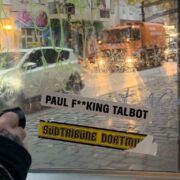Lockdowns, Lizards and the Zombie Apocalypse.
Both myself and Chris are professional tattooists and shop owners in the UK. We started the channel during the first of the Covid lockdowns in the UK in 2020. Locked in our houses, we’d been chatting for a few evenings about tattooing, life, the universe and everything when one of us (we can’t agree on who) had the idea to film the conversations and share them with other tattooists.
We’d both made each other feel a lot better about the “impending doom, everything its fucked, we’re all going to die’ feeling we both had going into lockdown. So we figured that hearing our thoughts on the subject might help other artists feel a bit better about things and give them a little hope. A problem shared and all that..
So we did, and it did. So we carried on.
Two plus years later we’ve both been working hard on getting the video and audio quality as high as we can (for a couple of tattooists) and improving ‘the content’. We try to make it honest and useful. We’re an independent show so we have that freedom. We wanted a channel full of the kind of stuff we’d look for. We both prefer the more DIY ethic of YouTube Vs the ‘production values’ of TV so we try to go for that look/feel.
Of course, we’re not presenters or filmmakers so it’s not always that easy. But, we do have a few skills. I did work as a sound engineer and a Lecturer and Chris studied film at college for a bit so we’re not complete novices. Plus, we’re not trying to make a massive Hollywood movie, just a YouTube show! We’re learning (and fucking it up) as we go and making changes from the feedback we get. Just make the best show possible, right? But not everyone wants to watch a YouTube show so…
Watch, listen, read
Before we started That Tattoo Show I’d spent the last couple of years teaching journalism/design at a Birmingham college/uni. During my brief stint as a teacher I learnt that different people learn and process information differently. For example; Some prefer to learn visually by following along, while others prefer to read and digest the information before applying it practically. Some can listen to the idea and visualise it for themselves. Tattoo education is really important to us. As is getting the information to tattooists in as many formats as we can. So, In response to that, we recently made the show available as an audio podcast (twice a month) and a blog (once a month). So you can watch, listen or read the content. You decide.
We’ll be here every Sunday
Each Sunday at 10am GMT we sit down and discuss current tattoo topics in an informal down to earth way that’s aimed at artists of all levels and abilities. We also throw in some ‘food for thought’ self-improvement type discussions too. Because, early on, we decided that we didn’t want to teach tattooing. We both firmly believe that this is better done in a studio setting with a mentor but, we had to face up to the fact that more and more artists are teaching themselves. So, instead of getting involved in that ‘for clicks & clout’ circus we decide to stick to the kind of thing that you don’t learn in an apprenticeship or online ‘course’.
Ask any tattooist who’s been doing it for a few years and they’ll tell you that learning to tattoo is the easy bit. Running a business and acquiring all the skills you need to have in the modern tattoo world is one of the biggest challenges facing todays tattooists. We try to focus on that, condense our years of experience, along with the stuff we’ve learnt from others over the years into digestible, easy to apply ideas that can help any tattooist at any stage of their career. The business of being a professional creative in the 21st century and everything that involves.
Each month I’ll give you a little taster or what we’ve been discussing and focus the rest of the column on a single discussion that I think might interest (most) of you.*
On the channel this month:
- Up Your Tattoo Game
- Our Pick of Essential Tattoo Gear That costs less than £100
- Bad heals linked to Covid
- Dermatologists have reported a link between recent Covid infection and bad Tattoo Heals
- Tattoo Incorporated
- Is the rise of the Tattoo Conglomerate good or bad for the industry?
Feel like a Tattoo Failure?
This month I’ve decided to focus on a discussion about failure and success and the POSITIVE effects of both. Yep, that’s right. The Positive effects of failure!
I learnt something really important the other day. To overcome artistic failure, it isn’t about how much happiness you want. It’s about how much suffering you’ll take to acquire that happiness. And success – in all our myriad of definitions of it – depends on that.
“Who you are is defined by what you’re willing to struggle for.” – Mark Manson
To Overcome Artistic failure right now you simply have to understand and accept that failure is inevitable and that your Successes can be a direct result of your failures.
While we’re filming That Tattoo Show we accept that failure is a part of the process of getting better. Mistakes happen & no matter how hard we try sometimes we get things wrong. But it’s what we do when faced with that failure that matters. We identify the problem and either solve it or – at the very least – come up with a different idea and try that. Then we repeat this process until it works. Watch one of the early version of the show and you’ll see this process of failure, reinvention and refinement in process.
EVERYONE FEARS FAILURE
What people do with that fear is very different AND very important. Some use it to push themselves forward while Others feel the fear and never try. For many artists, the fear of failure really ‘kicks in’ when they ‘go pro’.
Just doing art as a hobby is much easier. You don’t have to share if you don’t have any of that annoying commercial pressure. Trying to be a professional artist not only raises the stakes, it brings with it visiblity. Once people are watching you, you suddenly feel like the world is critiquing your every move. Suddenly you CAN fail.
But who says we have to be afraid of failing? And if we are afraid, how can we use that fear as motivation rather than intimidate?
ARTISTIC FAILURE IS HERE TO STAY
You might as well come to grips with it now, but failure is here to stay. It’ll happen, that’s a fact. How you respond to it is up to you. If failure didn’t exist, we’d be great at everything and life would be boring. Nothing in life is worthwhile without skinning your knees a bit. What makes us an expert in our field is the fact that we’ve failed countless amounts of times but are still standing and have gained wisdom as a by-product. So the more we fail and endure, the more people will look to us as an authority in our industry.
Instead of feeling sorry for yourself and getting dragged into the downward spiral, make note of all the things that happened that led to your failure and promise yourself to take action toward a better outcome next time.
“What you resist, persists.” ~ Carl Jung
If we’re so afraid of failing that we don’t even try then we’ve forgotten something very integral to the basic human condition. That we MUST fail in order to learn.
As children we fail all the time. We get up, dust ourselves off and try again and we learn. Eventually we master the task at at hand and move on to the next. At some point from from childhood to adulthood we forget a simple truth. Failure is not an endpoint, it’s the mid-point. It’s life’s educational tool, and we need it. So how do we get past that fear of becoming a professional artist in a practical, daily manner?
IT’S NOT ALL FUN & GAMES
Contrary to what a lot of people believe art isn’t all fun and games. It’s challenging but Overcoming your failure and challenges can actually be very good for you.
Underneath the pretty colours and intricate details are struggles that can only be understood by those within the artistic community. My biggest tip for overcoming feeling of failure is to share them with artists around you. You’d be amazed at how much better you’ll feel just knowing that all the amazing artists you know suffer from the same problems you do. And they sometimes have incredible advice and insights that could really help you overcome your anxiety about failure.
1. Risk the little things first.
You need to get used to the fear and accept it’s presence so start with some little things. The sooner you can get comfortable with the idea that fear is a constant presence in your life the sooner you’ll be on the road to overcome artistic failure..
Try starting with something that has nothing to do with your art. Cook a meal from scratch or take a music lesson. Something that you’ll probably fail at but that doesn’t matter if you do.
2. Remember and record your success
Creative people tend to daydream. It’s how we problem solve. But we rarely achieve the level of success we dream about. However, it’s possible that you’ll find yourself more successful than you thought you’d be. At that point you’ll probably be looking back and wondering ‘how did I do that?’
It’s important that you write your successes down, and keep a list somewhere you can refer to. When you start to feel the fear of failure creeping back in you can look back at the list and remind yourself of your previous success. It’s a very handy way to get your courage back.
3. Fail and write down why.
Often failure has very little to do with our own abilities and skills, and everything to do with timing, location, and the whims or abilities of others. You need to remember that certain circumstances are out of your control.
Write down your failure and identify the cause. If the cause was you, then you can plan to succeed next time. If the failure was outside of your control, then it’s just one of those things. We can still learn from those failures, of course. We just learn something different.
Don’t expect people outside your industry to understand. You won’t be able to properly express the complex conflicts between mind and body, frustrating and disappointing results to outsiders who just don’t understand what being an artist really means.
DON’T IGNORE JUST THE NEGATIVE VOICES, IGNORE THEM ALL!
From the moment we ‘go pro’ in the 21st century our art is on public display for the world to see and comment on. And of course, with all the positivity and awesome feedback, comes the negative stuff. Mean, insensitive comments from negative people that are very easy to get wrapped up in. This is poison to creatives, making them feel that their art is worthless.
The very simple truth is that – to overcome artistic failure – you have to learn to ignore these negative voices. To do that you have to ignore the positive voices too. I know that may seem like an odd idea so I’ll explain.
Understand that compliments – nice as they are – very often come from a place of no knowledge of the subject at all. Why should they? You don’t have to be a professional art critic to enjoy art, right? And that is exactly the same place that all that criticism is coming from. A place of NO expertise and NO understanding of art.
So if you recognise that the good stuff – however nice – is realistically worthless. Then, based on that same principle, you can ignore the bad stuff for exactly the same reason. Just put no value in either side and you’re free to move on and create.
Don’t let imposter syndrome or those pesky trolls prevent you from doing the very thing that makes you happy. Whether that be drawing, singing, dancing, or whatever. Just go and live your best life & Overcome those feelings of artistic failure.
That’s it for this month, tell the judge, tell your lawyer, tell your priest. We’ll be here every Sunday.
WATCH: youtube.com/thattattooshow
LISTEN: Wherever you listen to podcast
READ: www.thattattooshow.co.uk









